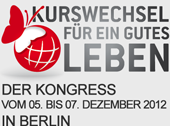International Conference "Changing Course for a Good Life"
With a call to "change course", which links an ecological restructuring of the economy with the expansion of life opportunities and the democratization of society, IG Metall - the German Industrial Union of Metalworkers - intends to add its own conceptual contribution to the broader social debate.
Here you will find the schedule
IG Metall’s commitment to link ecological and social questions has a long tradition, dating back to the IG Metall Congress "Task for the Future: Quality of Life" held in Oberhausen in 1972, and the initial report by the Club of Rome entitled "The Limits to Growth" (which also appeared in 1972). The continuing exacerbation of global crises – both economic and ecological – makes clear that we must put a call to change course on our agenda with more urgency.
IG Metall is organizing an international conference to be held in Berlin from 5th-7th December 2012 at which we intend to promote and intensify the discussion of trade union positions. Conference delegates will discuss a new concept of progress for industrialized societies and alternative paths for development with representatives from politics, academia, environmental associations and business.
At the conference there will be twelve forums and
two round tables to the future of social Europe.
Forums at the conference:
- Growth Discourse - Is there a socially and ecologically reasonable level of economic growth? How should it look like?
- Regulation of the Financial Market - How can we confine the destructive influences of the financial market system? How can we reduce financial markets to a level necessary for real economy?
- Global Inequality - How can the demand for equal chances be realized? How can we overcome global inequality despite limited resources?
- Sustainable Restructuring of Industry - How can we establish a sustainable industrial policy? What are the important parameters?
- The Future of Work-oriented Society - Are the concepts for full employment and standard working times realistic objectives? What are the prospects of professions and how will employment develop in the future?
- Revitalization of Democracy - How far has the crisis of democratic institutions already advanced? How can further democratization of society be improved?
- Industry "going green" - How do companies create and use new green growth markets? How can work councils and NGOs influence investment strategies?
- The Architecture of Energy Transition - How can we manage energy transition to become a project with regard of innovation and employment?
- Future of Mobility: Future of the Transport Industry - What changes do we have to expect in the traffic industry if traffic systems are becoming more connected?
- Decent Work - In which way does work load change? How to improve the quality of work? What will work look like in the future?
- Life Opportunities and fair Distribution - What is necessary to unfold life opportunities? What is the significance of equal opportunities and how can gender equality be achieved?
- Democratization of the Economy - How can we expand the influence of the working class on investment and strategic company decisions? How can this be combined with the social and ecological transition process?
Europe´s Prospects
Round table 1: What will a New Social Contract for Europe look like?
Round table 2: Trade Unions´ Paths towards a Social Europe


